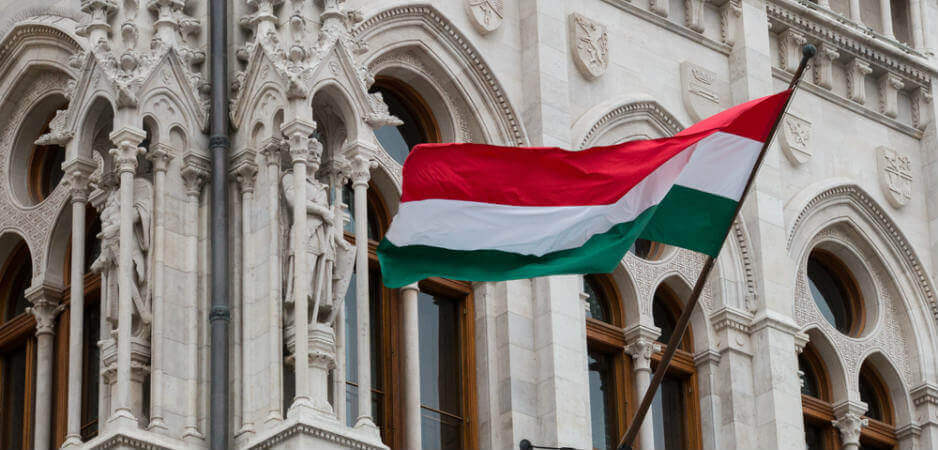Ahead of Hungary’s national election on April 8, the far-right Jobbik party has drastically changed its image.
Jobbik (Movement for a Better Hungary), where jobbik is a play on words in Hungarian, meaning both “better” and “more to the right,” first arrived on the Hungarian political scene in 2003. In 2005, Jobbik joined forces with the first major far-right party since the transition, The Hungarian Justice and Life Party (Magyar Igazság és Élet Pártja, or MIÉP), winning just 2.2% of the vote in the 2006 national elections. After splitting from MIÉP, Jobbik managed to win 16.7% of the national vote in 2010 and 20.2% in 2014, quickly becoming the third largest political party in Hungary behind the (arguably) radical-right Fidesz and left-wing Hungarian Socialist Party (MSZP.)
Back in 2014, Jobbik’s rhetoric and, it can be safely assumed, ideology, was mostly nationalistic, anti-liberal, anti-EU, and often anti-Semitic, anti-Roma and homophobic. As Hungary approaches its next national elections on April 8, however, Jobbik has drastically changed its image. Over the past few years, Jobbik has gone as far as reaching out to Jewish communities, changing its rhetoric to pro-EU and apparently changing its view on banning Budapest’s gay pride parade. Jobbik’s founder and current leader, Gábor Vona, describes his new vision for the movement as a “modern conservative party.” Yet the question remains, Has Jobbik really changed all that much? Many opposition parties don’t believe it has.
On the Campaign Trail
As the ruling party, Fidesz, controls nearly all popular media in Hungary, campaigning opportunities for the opposition are limited. Because of this, the opposition has taken to social media. This is obviously problematic, as it only reaches a certain portion of the electorate. Fidesz also has control of the billboard spaces across the country due to new regulations. Indeed, splashed all over the capital and the countryside are Fidesz ads, like the one of the Hungarian-American Jewish philanthropist George Soros’ arms around the opposition leaders, baring wire-cutters, with the inscription, “Together they would break down the border-protection.” These billboards show Vona standing among left-wing party leaders and, in election fliers sent out under the same image, he is described as being a staunch supporter of Islam.
A noticeable difference in the run-up to this year’s national elections is the focus on social media campaigning. Most major parties have videos targeting potential voters, with Jobbik the most active. Its videos largely focus on Vona: One shows people talking about how good, funny and interesting a person he is, while another follows Vona as he exercises at the gym. A documentary about Jobbik was recently released, supposedly made by an American filmmaker, about the party’s “true” past, which claims that Jobbik has been misrepresented for the past decade — that it has, indeed, always been a centrist party and never a radical-right one. However, when speaking about Jobbik’s “positive program,” the image is of an interview with a Jobbik mayor of Asotthalom, who happens to be the founder and leader of the extreme-right Sixty-Four Counties Youth Movement (Hatvannegy Vármegyei Ifjúsági Mozgalom).
Another video shows Vona speaking to a room full of his voters, defending the leader of one of the opposition parties. On the surface, at least, Jobbik has changed its image. The reality is that Jobbik is still supported by members of the radical right, and it is clearly still tied to several extremist organizations around the country.
The New Political Far Right?
Jobbik’s contested image is further complicated by the ideological shift by Fidesz, which originally formed in 1988 as an anti-communist party. Since winning the 2010 elections and reelected in 2014 (with just under 45% of the vote in the latter, resulting in a supermajority), Fidesz has displayed Holocaust-revisionist tendencies, militarized the country’s southern border, led a campaign against migrants, created an environment where hate speech is tolerated, and countenanced the paramilitary activities of radical-right groups. Prime Minister Viktor Orbán has even declared the country to be an illiberal democracy. Most recently, Fidesz has lashed out against NGOs and spearheaded a campaign against George Soros, in addition to attempting to close the Central European University that he founded. Indeed, many Hungarians now wrongly believe that Soros will run in the upcoming elections.
In January 2011, the Fidesz government enacted a law allowing Hungarians living outside the country’s borders to apply for citizenship. Here, a Hungarian is defined as a person descended from someone who lived within the borders of Hungary before 1920, or between 1941 and 1945, and who speaks Hungarian. This new law resulted in thousands of people applying for citizenship within days after the law was enacted. At the moment, there are nearly 360,000 ethnic Hungarians with voting rights, including over 150,000 residing in Romania.
Many ethnic Hungarians, especially those in the region of Transylvania, are now loyal to the Fidesz government. As all Hungarians have the right to vote in the country’s national elections, regardless of residency, this entails a huge boost in numbers for Fidesz. It has started directed campaign efforts at Transylvanians and the Székely people on social media, with threats of opposition parties taking away their Hungarian citizenship. Fidesz has extended its billboard campaigns into Transylvania — that is, in Romania — where it has the support of local leaders.
After a recent defeat in the mayoral by-election in Hódmezővásárhely, traditionally a Fidesz stronghold, the party toned down its focus on Soros. Fidesz has now turned its attention to migrants and gypsies (with Orbán publicly drawing connections between the two), which many believe is a ploy to attract Jobbik’s disenchanted voters. Opposition leaders have called this victory a “turning point” and “a good omen for April 8th.” This, of course, remains to be seen.
The country awaits this Sunday’s election with uncertainty. At the time of writing, Fidesz’s biggest opposition is Jobbik, while the left remains divided among five parties. The pressing question is, What would be better for Hungary: Orbán’s illiberal democratic state, which seems to be moving further to the right, or a potentially populist radical-right party masked as “modern conservative”? It remains to be seen what the future holds for Hungary. At the moment, the forecast looks bleak.
*[Centre for Analysis of the Radical Right is a partner institution of Fair Observer.]
The views expressed in this article are the author’s own and do not necessarily reflect Fair Observer’s editorial policy.
Photo Credit: Yurlick / Shutterstock.com
Support Fair Observer
We rely on your support for our independence, diversity and quality.
For more than 10 years, Fair Observer has been free, fair and independent. No billionaire owns us, no advertisers control us. We are a reader-supported nonprofit. Unlike many other publications, we keep our content free for readers regardless of where they live or whether they can afford to pay. We have no paywalls and no ads.
In the post-truth era of fake news, echo chambers and filter bubbles, we publish a plurality of perspectives from around the world. Anyone can publish with us, but everyone goes through a rigorous editorial process. So, you get fact-checked, well-reasoned content instead of noise.
We publish 2,500+ voices from 90+ countries. We also conduct education and training programs
on subjects ranging from digital media and journalism to writing and critical thinking. This
doesn’t come cheap. Servers, editors, trainers and web developers cost
money.
Please consider supporting us on a regular basis as a recurring donor or a
sustaining member.
Will you support FO’s journalism?
We rely on your support for our independence, diversity and quality.







